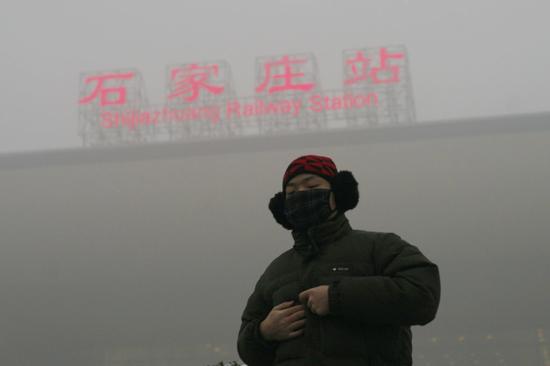China's 'most polluted' cuts coal
 0 Comment(s)
0 Comment(s) Print
Print E-mail Xinhua, May 15, 2014
E-mail Xinhua, May 15, 2014
Beijing, nearby Tianjin Municipality and Hebei Province have cut coal consumption, but the difference it has made to air quality indices remains to be seen.
|
A man wears a mask to protect himself from hazardous smog in Shijiangzhuang, capital of north China’s Hebei Province, on Jan. 28, 2013. [File photo] |
Beijing-Tianjin-Hebei were China's "most polluted" last year, and, between them, agreed to burn 63 million fewer tonnes of coal by 2017 than in 2012. The Ministry of Environmental Protection issued a multi-pronged approach to air pollution in the region in September 2013.
Natural gas has been promoted to try to end over-reliance on coal, but Tianjin and Hebei have found it hard to keep up with the pace of the capital. Hebei Province has faced a gas shortfall of about 6 billion cubic meters since it started to reduce coal consumption and the switch from coal to gas has gone accordingly slowly, according to Wang Luguang, deputy head of environmental protection in Hebei.
Tianjin planned to increase use of natural gas in central heating and convert some coal burning boilers, going so far as to announce that more than 60 percent of heat will be provided by natural gas by 2014, but the target will not be met. Gas boilers built last year are not in use because of lack of gas, said Wen Wurui, head of environmental protection in Tianjin.
"Beijing has enjoyed a lot of preferential polices in gas supply," said Cheng Xu, professor of biotechnology engineering at China Agricultural University. "The government should also take the energy demands of Tianjin and Hebei into consideration when it comes to tackling smog as a whole."
Wang Zhongmin of China's coal quality supervisor believes reducing use of low-quality coal is a more practical way to fight pollution in rural areas that switching to so-called clean energy sources. To encourage clean coal, Beijing and several counties have offered subsidies. A rural family can get 400 to 600 yuan for purchasing one ton of clean coal. With the financial support of the government, the price of clean coal is about the same as that of low quality.
In Hebei Province, only a few cities like provincial capital Shijiazhuang have adopted the same policy as Beijing. Without subsidies, most villagers in Hebei are likely to purchase low quality coal.







Go to Forum >>0 Comment(s)